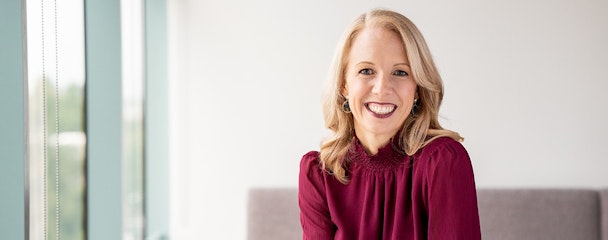3 Actionable Insights with… LinkedIn chief marketing officer Melissa Selcher
The Drum’s 3 Actionable Insights series asks industry leaders to give their thoughts on the actions our readers should take immediately.

‘There is power in asking for help,’ says Selcher
Finding a job. Learning a new skill. Advancing difficult conversations about the challenges within today’s workplace. LinkedIn lives on the digital frontline when it comes to all of these areas.
Based on the platform’s bird’s eye view, The Drum asked Melissa Selcher, chief marketing and communications officer at LinkedIn, to share three actionable insights for success based on the difficult learnings of the past nine months. Here’s what she had to say.
1. Solve for trust above all else. “At LinkedIn, one of our definitions of trust is ‘consistency over time.’ Showing up on the spot and just saying, ‘hey, here‘s what we stand for. Believe us’ without a track record [doesn’t work.] People are watching with an increased intensity and increased recognition and asking, ‘how true is this?‘ And, ‘are the actions and values actually demonstrated over time?‘ So, the more consistent a track record and the more you‘re building upon that over time, that‘s how you earn trust. You can‘t build trust overnight.
For marketers and communications leaders, it‘s not enough to just make the decisions on where you‘re going to act. It’s also how will you ensure that your stakeholders know what you stand for. Communicating that in a way that is consistent over time is a critical job that falls to all of us.
We recently worked with Forbes to look at the world‘s most influential chief marketers. We found that during the pandemic, the leaders who have most consistently been turned to as trusted resources were the ones who have consistently invested in building a trusted voice over time. They are the ones who, at least on LinkedIn, are six times more likely than the average LinkedIn user to share content. They ended up being the ones that people turn to during a time of crisis, to learn from and be inspired by.”
2. Focus on people and business results will follow. ”Any time you go into a crisis, it’s a good reminder that people are at the heart of what you do. When coronavirus hit, what we saw was the leading companies immediately shift to serving and supporting their stakeholders — both their employees and their customers, first. That became the basis of their programs, whether it was offering critical support programs to their employees or reaching out and offering flexible terms to their customers. It was just a great reminder that we don’t do business with entities. We do business with people and during a crisis putting people first is most important. I think it’s a good reminder for even in non-crisis times.
Another thing I personally learned, during the pandemic, is just how different everyone’s situation is. All of a sudden [you know about how people are] managing and caring for kids or parents. Or you never quite knew what business situation your customers were in. We need to continue to listen better and more closely than we ever have. We need to be more individualized and personalized with how we treat our employees and our customers — and remember one size doesn't fit all.
When it comes to employees, the wellbeing issue is very real. We saw, in our Glint data, a 33% increase in people saying that they're burnt out, fatigued and overwhelmed. I think we all see and feel that. It’s the responsibility of companies to figure out how to put their employees well-being first. One of the things we talk about internally at LinkedIn is destigmatizing mental health — it’s okay to not be okay — and giving employees a chance to just openly ask for the help that they need.
It’s hard to focus on people right now without looking at the record unemployment that's happening across the globe and the well-being of job seekers. One of the biggest things we’re focused on is destigmatizing asking for help in your career search. We know, obviously from the LinkedIn perspective, that your network is a critical way that most people get jobs. But there is absolutely a stigma where people feel like they can’t ask for help and that it’s embarrassing to be unemployed. That’s why we recently launched was a photo frame that goes on your profile that says: ‘#OPENTOWORK.’ For the three million members who adopted it, they received 40% more In-Mails from recruiters just by adding the frame. In some respects that even surprised us. So, we developed a campaign around that just to show the rest of our members that there really is this power in asking for help.”
3. Stay agile and always keep learning. ”People love the buzzwords like transformation and innovation. This year has made it incredibly clear that if you aren’t growing, changing and adapting you’re likely not going to make it and you’re not going to thrive. One of the things that just immediately jumped on LinkedIn when we hit the pandemic was the amount of learning that started happening on the platform. We’re seeing members conduct millions of hours of LinkedIn Learning every week — which has more than doubled year-over-year.
There are dramatic increases in the amount of learning that CMOs and comms leaders are doing. Many are dealing with traditional channels just evaporating overnight — all of a sudden digital is your only vehicle. We saw social media marketing videos increase 300% in viewership among marketers compared to last year and digital marketing video consumption increase 195%.
We’re also seeing a significant increase in content that helps leaders grow their understanding, their tools and their consciousness in the areas of diversity and equity. One of our more popular courses is called ’Confronting bias: thriving across our differences.’ We saw a 572% increase for that course. So that’s another area that just we’re continuing to create content on a real-time basis.
[When it comes to discussing important issues overall], people have turned to the platform, probably even faster than we expected. It makes total sense. Your workplaces disappeared and people needed a place to have those conversations.
A really interesting [development] that we’re working through constantly is that conversations that never happened before at work are now work-conversations. You never used to talk about race at work. That’s a very important work conversation now. You never used to talk about politics at work. That is a very real topic now. LinkedIn, along with the rest of workplaces, are learning how to enable those conversations to happen in a safe and constructive way. We 100% believe those conversations need to happen on LinkedIn and that’s how we'll move forward and raise consciousness across the board. We also have to figure out how to do them in a way that is open, honest, constructive, safe and trusted for our members. That’s something that we’re continuing to work through, with our members, on a day-to-day basis.”
Check out more of our 3 Actionable Insights series, and don’t forget to sign up for The Drum’s daily US email here.

